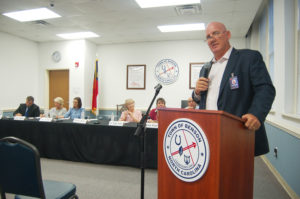When the Johnston County School Board gathered at the Benson Town Hall Conference Center last month they likely violated the North Carolina Open Meeting Law.
All seven school board members attended a July 23rd community wide education session that was sponsored by the Benson Chamber of Commerce. Residents submitted questions to the school board and the board later responded at the conclusion of the meeting with answers to those questions.

Benson Chamber Director Loretta Byrd told The Daily Record, ““We did this because we have parents that have some concerns and they wanted a chance to talk directly to the school board,” Byrd said.
The Benson Chamber notified its members of the event, however Johnston County Public Schools failed to notify the media and those on their sunshine list as required by state law.
In an email last week School Board Attorney Jimmy Lawrence told JoCoReport, “The event was supposed to be advertised and I thought the media would be notified. However, this was not a regular, special, or emergency meeting under the policy. It was an invitation by Benson area for board members to hear concerns about their area schools and no action or conversations or dialogue would be had by the board. It was something generated by the Benson area and a new way of communication by an area of the county to school board members. It was basically a information meeting to hear about the school in the area.”
In a follow up email, Lawrence said the board clerk sent a media notice to the Public Information Office and they posted it on the school website. However, no email was sent to members of the media. Public bodies must email or deliver notice to any person who requests notification. The school board regularly sends out emails for their monthly meetings to media outlets and those on the sunshine list.
Under NC GS 143-318.10 a quorum of an elected public body in the same location does not always require public notice under the NC Open Meeting Law. This includes conferences, training sessions, or events at private homes. However if attendance is a group decision, not just members randomly showing up by chance, it triggers the notification requirements.
If the school board had gathered at the Benson Chamber event and discussed matters not within their scope or jurisdiction, it likely would not have been an official meeting. However, by discussing school-related issues, it was a Public Meeting. Public notification is required even is no business is transacted.
JoCoReport reached out to Frayda Bluestein, Distinguished Professor of Public Law and Government at the School of Government at The University of North Carolina at Chapel Hill. She referred us to an article she published about Open Meeting Laws. In the article Bluestein said, “…a reasonable interpretation of the words in the statue suggests that where a majority of a public body intentionally gathers together for a meeting involving public business, notice should be provided … It’s common for city and county clerks to err on the side of caution and provide notice that a majority of the board will be in attendance, sometimes including a statement in the notice that no action will be taken.” In this case, no notification was made by Johnston County Schools.
State law also required organizations, like Johnston County Public Schools, to keep accurate minutes of all meetings and to make them available for public inspection and copying. No minutes were taken at the Benson meeting.
Lawrence, the school board attorney, said the event was not a meeting as described under (Johnston County School) board policy. However, North Carolina Open Meeting Laws take precedent over local board policies. Sunshine laws are in place so that public officials conduct business in full view of citizens. Violations can expose the school system to liability and even a civil lawsuit. Plus, any action taken during a meeting not properly advertised could potentially be nullified.











